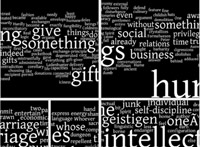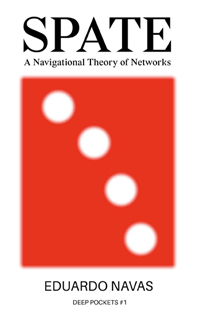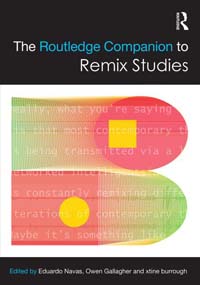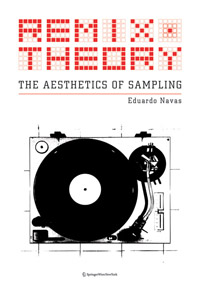The Author Function in Remix, by Eduardo Navas
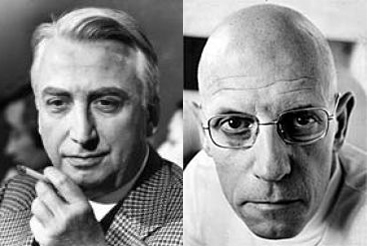
Image sources
Barthes (left): Project Narrative
Foucault (right): K-punk
The Author Function in Remix
This text is a theoretical excerpt from one of my chapters on the role of Remix in Art. It outlines how the theories of Roland Barthes and Michel Foucault on authorship are relevant to New Media, particularly their link to the interrelation of the user and the maker/developer in terms of sampling (a vital element of Remix as discourse). While the text does place a certain emphasis on art, the propositions extend to various areas of culture. It was previously presented as a lecture for ICAM at UCSD on April 6, 2005:
http://navasse.net/icam/icam110_spring05_schedule.html
Remix is Meta
The act of remixing (which I refer to in terms of discourse as Remix) developed as a meta-action. Its specificity in the second half of the twentieth century can best be understood when realizing that the strategies by artists throughout the first half of the twentieth century had to be assimilated to then be recycled as part of the postmodern condition in the second half—a time when remix proper developed in music. The acts of collage, photomontage and the eventual development of mixed media had to be assimilated, not only by the visual arts, but also mainstream media for the concept of remixing to become viable in culture. Remix’s dependency on sampling questioned the role of the individual as genius and sole creator, who would “express himself.” Sampling, then, allows for the death of the author; therefore, it is no coincidence that around the time when remixes began to be produced, during the sixties and seventies, authorship—as discourse—was entertained by Roland Barthes and Michel Foucault, respectively. For them, “writing” in the sense that Rousseau would promote the expressive power of the individual no longer was possible. Sampling allows for the postmodern condition (which some consider to be part of modernism) to come through. To this aspect of sampling we will turn to in the next section. What follows is an outline of Barthes’s and Foucault’s respective theories which were conversant with contemporary art practice, during the period when both authors developed their theories, as it will become evident throughout my argument, their ideas are quite relevant to media culture.
The Role of Author and the Viewer
In his essay, “The Death of the Author,” Roland Barthes questions the concept of authorship. For him it is the text that speaks to the reader. He writes, “A text is made of multiple writings, drawn from many cultures and entering into relations of dialogue, parody and contestation, but there is one place where this multiplicity is focused and that place is the reader, not, as was hitherto said, the author.”[1] With this statement he summarizes his argument that we should treat the text not as something coming from a specific person, but as something that takes life according to how the reader interprets the writing as a collage of diverse sources. For Barthes, it is the reader who holds the real potential to make discourse productive. He looks at specific authors, like Proust, Mallarme and Valery as authors who “Restore the place of the reader.”[2] The author ceases to matter for Barthes because only in this way can the text be set free, for to have “an Author is to impose a limit on that text, to furnish it with a final signified, to close the writing.”[3] Barthes wants the reader to overthrow the myth of the author as “genius” as it has been promoted since the renaissance. For Barthes, the text’s unity is not in its origin but its destination. And only the reader can define that. It is the reader who completes it.
Michel Foucault also questions the role of the author in contemporary culture, but unlike Barthes, who only pointed out the necessity to shift our cultural attention from the author to the reader, Foucault concludes that even though the death of the author as a great individual has been claimed, the notions supporting such claim actually have only renegotiated the privilege in authorship.[4] To prove this Foucault examines two notions supporting contemporary discourse. The first is the concept of the work, which includes everything an author has written, and the second is the notion of writing, which during Foucault’s time and even in our times pretends to function autonomously. Foucault goes on to claim that this is not so and sets out to prove his point by explaining the definition of his own term “The author function.” Foucault considers the author function to provide a way of controlling discourse. This actually is not too different from how Barthes considers the idea of authorship being a way of limiting the possibilities of the text. The Author Function is a classificatory function.[5] It is not universal, although such discourse could be presented as such. The author function is not created by a single individual but rather it is a complex web of power shifts that leads up to the construct of the author.[6] The author function becomes clear when Foucault explains it in relation to Marx and Freud, two “authors” who created discourses following their names, Marxism and Freudianism (or psychoanalysis). Foucault reasons that these two authors developed concepts that were reevaluated by later generations. Such discourses can be changed which is not necessarily true for the field of the natural sciences, whenever one refers back to the origin of the argument to question it, as he explains, “A study of Galileo’s works could alter our knowledge of the history, but not the science, of mechanics; whereas a re-examination of the books of Freud and Marx can transform our understanding of psychoanalysis or Marxism.[7]
In other words, discourse as developed by an author can be changed. While Foucault went further than Barthes and explained the power dynamics supporting the author, he also agrees with Barthes that one day the author, or the “author function” for him, will disappear: “We can easily imagine a culture where discourse would circulate without any need for an author. Discourses, whatever their status, form, or value, and regardless of our manner of handling them, would unfold in a pervasive anonymity. No longer the tiresome repetitions.”[8] One can notice hope in Foucault’s final statement for a time when a more democratic model would be at play; this has been a pronounced interest of artists and media researchers, and has provided fuel for the historical and neo-avant-garde to stay active since the beginnings of modernism. Barthes and Foucault’s reflections on authorship were already being put into action in their own time with Conceptual and Minimal art practices, which relied largely on appropriation and allegory to derive critical commentary. The notion of authorship which they examined can now be assessed, especially in relation to new media practice, which is largely dependent on the “reader” or user, as the participants are commonly called. This particular dynamic is actually an extension of sampling, which started during the early days of modernism with photography and music.
Sampling allows for the death of the author and the author function to take effect once we enter late capitalism, because “writing” is no longer seen as something truly original, but as a complex act of resampling and reinterpreting material previously introduced, which is obviously not innovative but expected in new media. Acts of appropriation are also acts of sampling: acts of citing pre-existing text or cultural products. (Let us extend the term “text” here to the visual arts and media at large.) This is the reason why citations are so necessary in academic writing, and certainly is something that is closely monitored in other areas of culture, like the music industry, where sampling is carefully controlled by way of copyright law. So, writing in the sense before the enlightenment no longer takes place. Instead, the careful choices of preexisting material made by authors in all fields are revered. Our most obvious example is the work of Duchamp (which I’ve cited in my definition of Remix[9] ), who understood this so well that he decided to simply choose readymades as opposed to trying to create art from scratch; he understood the new level of writing, or creating that was at hand in modernism, which entered a stage of meta—of constant reference, relying on the cultural cache of pre-existing material.
So writing’s and art’s true power is selectivity, and this comes forth today in sampling, a privileged symptom of the postmodern. The selectivity found in the death of the author and the author function as defined above is what makes the notion of interactivity easily assimilated because of sampling. For example, once cut/copy and paste is assimilated not only as a feature for the user to write her own texts, but also to reblog pre-existing material, the user then becomes more of an editor (a remixer) of material, by reblogging under a new context, as a new composition that allegorizes its sources. This possibility of selecting and editing to develop a specific theme according to personal interests plays a key role in how the art viewer, or new media user will relate to the person who produced the object of interaction. This shift, while redefining the concept of creativity and originality also develops new challenges for the media producer.
[1] Roland Barthes, “The Death of the Author,” Image Music Text (New York: Hill and Wang, 1977), 148.
[2] Ibid.
[3] Ibid.
[4] Michel Foucault, “What is an Author,” The History of Art History: A Critical Anthology, ed. Donald Preziosi (New York and Oxford: Oxford University Press, 1998), 299-314.
[5] Ibid, 305-307 .
[6] Ibid, 308-09.
[7] Ibid, 312.
[8] Ibid, 314.
[9] See: “Remix Defined,” Remix Theory < https://remixtheory.net/?page_id=3>.
Lascia un commento
You must be logged in to post a comment.

